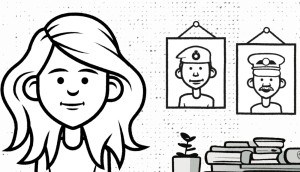Case studies
Sophia
Sophia, 15, talks about her experiences of growing up in the fourth generation of a military family
 "I’d say the main thing about growing up in a military family that is different from other young people’s experiences is all the moving around. By the time I was 12, I’d lived in nine houses. But I think that has made more adaptable than other people my age.
"I’d say the main thing about growing up in a military family that is different from other young people’s experiences is all the moving around. By the time I was 12, I’d lived in nine houses. But I think that has made more adaptable than other people my age.
"My dad served as a Royal Engineer in the Army for 24 years, my grandpa was in the RAF, both my great grandads were in the Merchant Navy and my great-great-grandad was in WWII as a paratrooper, so there is a long family tradition of service.
"When I was little I hated my dad being away in a different country and I worried about whether he was safe or not, but I loved it when he came home as we had so much fun, and there’s lots of events like families day that other children wouldn’t get to have.
"The great thing about being a forces family is the sense of community, living behind the wire or just on the patch, you’ve got people around you that are experiencing similar things and they understand what you are going through.
"Moving schools and having to start again was challenging, especially in different education systems. When I moved up to Scotland from England I found I was repeating a lot of subjects I’d already done. And not seeing family was hard – because a lot of the time you can be posted very far away from family and friends.
"When my dad left the Army two years ago, it was really confusing and stressful for everyone. I was sad to leave the military community and move into an ordinary house where I didn’t know the neighbours. But my dad was starting a new job at a windfarm company, and I was happy for him too as I knew he was excited about the change.
"Forces Children Scotland were really supportive. I worried that I wouldn’t be able to go there after my dad left the Army, but they work with veteran children too and it makes me feel good helping others by sharing my experiences of being a military child.
"Military families do need more help through the transition, especially for the spouses and the children – if my mum had been able to talk to someone about it, then everything in the house would have been calmer. It’s very confusing for a child, and very stressful for the parents as they can’t explain every little detail of what’s going on because they don’t know themselves.
"My school didn’t provide me with any specialist support – veteran children don’t really get talked about a lot in schools. My school has quite a lot of military children, so I think they’re quite busy, but I don’t think it should be the case that because you’re a veteran’s child you don’t need the support any more. I think there should be support in all schools whether your parent is serving or has left the forces.
"Being a veteran child doesn’t mean that you haven’t been through the same thing as a Serving forces child. I’ve still moved, I’ve lived in different countries, it’s just my dad’s out of the Army now.
"It’s good to know now I am not going to have to move school again, but sometimes, on days when you aren’t feeling happy, you do miss everything going in boxes, waking up in a new bedroom and starting all over again.
"Being in a forces family has definitely made me independent and I have learned how to make friends easily. I’ve moved around so much I’ve been able to experience and see things from different places in the country and I have a wide variety of opinions. It matures you a lot being a forces child."
Sophia shared her experience as part of my engagement work with Scotland’s veteran community to inform my report, Community and Relationships: Anything but Uniform. You can hear her speak about her experiences in the below animation.



